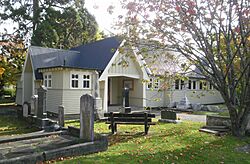St John's Church, Trentham facts for kids
Quick facts for kids St John's Anglican Church |
|
|---|---|
| St John the Evangelist Church | |

St John's Anglican Church
|
|
| 41°07′49″S 175°02′39″E / 41.13027°S 175.04405°E | |
| Country | New Zealand |
| Denomination | Anglican |
| History | |
| Status | Church |
| Dedication | John the Evangelist |
| Consecrated | 1865 |
| Architecture | |
| Architect(s) |
|
| Architectural type | Church |
| Style | Gothic Revival |
| Years built | 1861–1863 |
| Specifications | |
| Materials | Timber |
| Administration | |
| Parish | Trentham |
| Diocese | Wellington |
| Province | Anglican Church in Aotearoa, New Zealand and Polynesia |
St John's Church is a very old and special Anglican church in Trentham, Upper Hutt, New Zealand. It is one of the oldest Anglican churches still standing in the Wellington region. Because of its history, Heritage New Zealand officially recognized it as a Category 2 historic building on June 6, 1983.
Contents
How St John's Church Began
The land where St John's Church stands today was once part of a large farm. This farm belonged to a man named Richard Barton. He came to New Zealand from England in the 1840s. His farm and home in Upper Hutt were named Trentham. This name came from a place in England called Trentham Hall.
The Barton family was very generous. They gave the land for the church and helped a lot with its building. They even supported the construction of a house for the church's vicar in 1894.
The building of the church was supervised by Reverend Frederic Thatcher. He was a well-known church architect at that time. The first vicar, Reverend John E. Herring, started his work there in December 1861. He performed his first baptism in March 1862. Reverend Herring's time was short, and Reverend Amos Knell took over in September 1863.
Richard Barton was buried in the churchyard of St John's Church. There are also special brass plaques inside the church that remember him.
The Church's Official Opening
The building of St John's Church started in 1861 and was finished in 1863. It was officially opened, or "consecrated," two years later in 1865.
Reverend Thomas Abraham was in charge of the church from August 1865 to April 1868. By this time, the main part of the church was complete. Bishop Abraham officially consecrated the building and its land on December 17, 1865.
At first, only the central part of the church, called the nave, existed. But the Upper Hutt area grew a lot, especially after the railway line was completed in 1876. In 1884, a new architect, Frederick de Jersey Clere, was asked to add more sections. He designed a chancel and a sanctuary for the church. A Vestry, which is a room for clergy, was added in 1914.
It was sometimes hard to keep priests in the area during the late 1800s. However, in January 1903, Reverend Cecil J Smith arrived. He helped to bring new energy to the church and the local community.
Modern Changes to the Church
In the 1950s, St John's Church became very popular and grew a lot. Two big changes happened because of this. First, the church building was made larger by extending its sides. This work was finished in 1955. Second, the current Parish hall was completed in the 1960s.
Other changes to the church building include a new entrance area, or foyer, added in the 1980s. More recently, in 2004, the old pinex ceilings were replaced with gib board.
The Churchyard and Its History
The churchyard at St John's was the first European cemetery in the area. People started being buried there as soon as the land was consecrated in 1865. The oldest gravestone that can still be identified belongs to Richard Barton. He was a founding father of both the church and the district.
Many of Upper Hutt's early settlers are buried in this churchyard. In total, over a thousand people have been laid to rest there. Today, it is closed for new burials, except for ashes. However, it remains a place of interest for many. The churchyard also contains the graves of five New Zealand soldiers. Three of them fought in World War I and two in World War II. These graves are cared for by the Commonwealth War Graves Commission.
See also
- List of historic places in Upper Hutt
 | Aaron Henry |
 | T. R. M. Howard |
 | Jesse Jackson |

